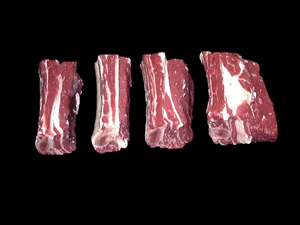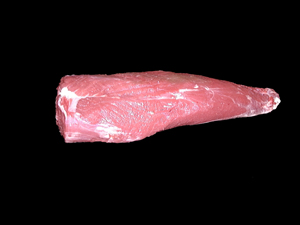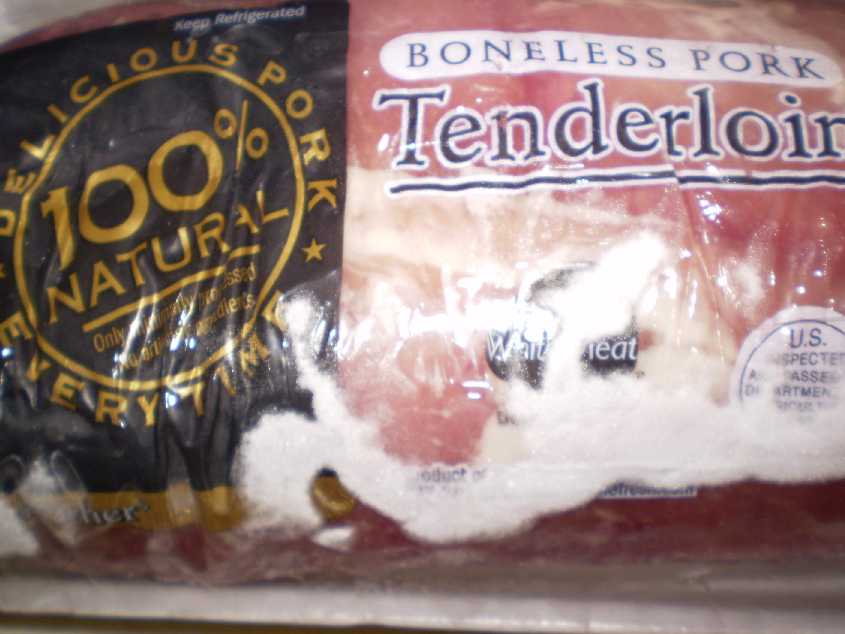 The
safest way to handle meat is to use it fresh and don't allow it to sit in
the refrigerator for days. If you're not going to use meat within a day,
keep it frozen until you're going to use it! I used to have a Food Manager's
License in Chicago (required by law to prepare food for the homeless and
needy in a Skidrow mission shelter). The biggest danger of Food Born
Illnesses is from not properly storing meats. Anything above 40 degrees
(such as ambient Room temperature) is referred to as The Danger Zone for
meats.
The
safest way to handle meat is to use it fresh and don't allow it to sit in
the refrigerator for days. If you're not going to use meat within a day,
keep it frozen until you're going to use it! I used to have a Food Manager's
License in Chicago (required by law to prepare food for the homeless and
needy in a Skidrow mission shelter). The biggest danger of Food Born
Illnesses is from not properly storing meats. Anything above 40 degrees
(such as ambient Room temperature) is referred to as The Danger Zone for
meats.
Most people think improper cooking is the primary cause of Food Born Illness; but it's actually not storing the meat at cold enough temperatures prior to using it that makes people sick the most. Cooking poultry (chicken, duck, turkey, et cetera) to 165 degrees Fahrenheit is considered safe. Albeit, salmonella bacteria can survive freezing and boiling. So heating foods is not a cure-all remedy for improper storage.
The reason why most people get sick is from buying meat from a store which accidentally left it sit out and doesn't want to lose money. Or their refrigeration equipment wasn't working correctly. Some simple rules that I follow are these:
-
 Only
buy meat from larger supermarkets which have a high turn-over rate
for meats. Smaller stores are far more likely to sell meats which have
sat for longer periods of time, are closer to expiration dates and are
old. They wrap new hamburger over old to hide it's age. There are some
great smaller meat markets, but my experience hasn't been favorable with
smaller businesses. I'd rather shop at a larger chain store when it
comes to buying meats.
Only
buy meat from larger supermarkets which have a high turn-over rate
for meats. Smaller stores are far more likely to sell meats which have
sat for longer periods of time, are closer to expiration dates and are
old. They wrap new hamburger over old to hide it's age. There are some
great smaller meat markets, but my experience hasn't been favorable with
smaller businesses. I'd rather shop at a larger chain store when it
comes to buying meats.
-
Trust your senses when buying! If your nose smells something offensive when you enter into a grocery store or meat market, leave!!! If the meat feels room temperature and it's obviously not as cold as normal, leave it!
I once bought meat from a reputable chain store, but I knew the temperature wasn't as cold as normal. It was obvious that the refrigeration wasn't working properly. The meat looked nice and red and I bought it. It was still ok. The next day when I went to cook, the meat was all rotted, smelling horrible. I brought the meat to one of their other stores and they replaced it. I wonder how many people got sick that day.
-
Always smell your meat before cooking with it. It may look fine but smell dead!!! If your nose doesn't like what it smells, throw the meat away. I toss meat into the garbage if it smells bad even a little bit. Fresh fish shouldn't have any smell. Fresh meats don't have much of a smell to them. Beef has a little smell of blood, but it is pleasant to the nose. I ALWAYS smell my meats before cooking or freezing them. I sometimes buy larger packages of meat (if that's all that's available) and open them as soon as I get home to store the meat in quart-sized freezer bags.
-
For roasts and thicker meats use a meat thermometer. Cook poultry to an internal minimum temperature of 165 degrees Fahrenheit. Pork to 155 and fish to 145.
Note: most websites and cookbooks tell you to put the thermometer in the thickest part of the roast (since it takes longer for the thicker area to cook). However, my cooking experience has taught me that the roast CONTINUES TO COOK a little bit once removed from the oven. Thus, I remove my pork roast when the thinner area reaches the minimum temperature, which is 155 degrees Fahrenheit. After sitting for a few minutes out of the oven, your roast will be perfect and juicy. Well-done meats become dry and tough. It's important to save the roasting juices from the baking pan to dip the meat in, or pour over the meat when you serve it. Meat should be hot, tender and juicy.
-
Be careful of small bones and grizzle. A lodged chicken bone or grizzle from slow-cooked chicken can be lethal. It's best if a parent carefully separate meat from bones and give just boneless meat to younger children under 10. This will prevent potential choking. Teach your children to eat slowly and always feel for bones with their fingers before putting a piece of delicious chicken or duck into their mouth. This goes for adults too.
You'd be shocked if you knew how many children choke and die on pieces of bone, hotdogs, popcorn and peanuts. Ever notice that you often get hiccups after eating one or two bites of a hotdog or soft pretzel? Hiccups are one of God's amazing creations. God gave the human body hiccups to prevent us from literally eating ourselves to death. You get hiccups because you're eating too fast. Different foods require different speeds to eat. If you chew a hotdog well, then you won't get any hiccups. It's when you take a bite and swallow that the body panics and says whoa!!! It's proper and healthy to chew one's food several times anyway. Children should be taught to eat slow, enjoy what God has put before them, and chew several times to help the stomach and not get hiccups.
-
Freeze any meat that you're not going to use within a couple days. It's ok to refreeze meat too. I do it all the time. Sometimes I have a hectic day and grab a bite to eat instead of cooking at home. If I have more meat in the refrigerator that I can cook in the next 2 days (or am not certain), I just go ahead and freeze it; better safe than sorry. I always store my fresh garlic cloves in the freezer in a freezer bag. I run garlic cloves under warm water when I need it and they thaw in under 10 seconds. It works great. Literally, after 10 seconds you can put them in a garlic press and they'll go right through.
-
Turn your refrigerator's thermostat down cold, just above freezing. By just turning your refrigerator's thermostat colder, all your foods will last MUCH longer. At higher settings, food will spoil in your refrigerator within 2 weeks; but at 35 degrees foods will last 6-8 weeks. I always store my loaves of store bought bread in my refrigerator, because bread spoils within a week where I live in more warmer and humid weather. If your eggs freeze, then turn the thermostat up just a tiny bit. I would rather deal with slightly frozen food than throw a bunch of food in the garbage or feel pressured to eat a bunch of food before it spoils. Turning my refrigerator down cold was one of the best things I've done in my little kitchen world. meats can last a month at cold temperatures.

 I
hate marble tile floors, which are as slippery as ice when they're wet. If
you walk outside in water, you'll break your neck on the floor when you come
inside. If you spill water you'll slip. It's dangerous. I keep a fitted
throw-rug down on my floor all the time.
I
hate marble tile floors, which are as slippery as ice when they're wet. If
you walk outside in water, you'll break your neck on the floor when you come
inside. If you spill water you'll slip. It's dangerous. I keep a fitted
throw-rug down on my floor all the time. 